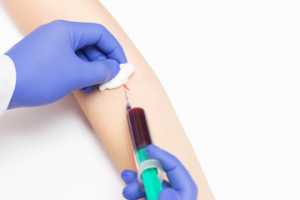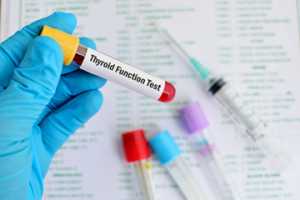Thyroid Function Tests- Purpose, Procedure And Results
What Are Thyroid Function Tests?

The thyroid is an endocrine gland, located at the base of your neck. This gland plays a vital role in regulating various body processes, such as growth, energy generation, metabolism, and development of the human body.
Triiodothyronine(T3) and thyroxine(T4) are the two main hormones that the thyroid gland produce. But if your thyroid gland fails to produce sufficient T3 or T4, then you may have hypothyroidism. Certain symptoms associated with this condition are:
- Lack of energy
- Depression
- Weight gain
On the other hand, you may have hyperthyroidism if your gland produces more thyroid hormones. The symptoms of hyperthyroidism are:
- High levels of anxiety
- Tremors( a neurological disorder characterised by involuntary shaking or trembling of different parts of the body)
- Weight loss
Procedure

It’s important that you inform your doctor regarding any medications that you’re taking or if you’re pregnant since both these can affect your thyroid function test results.
Venipuncture or blood draw is usually done at the doctor’s office or a lab. To make your veins fill with more blood, the technician/nurse will tie an elastic band around your upper arm. The technician/nurse will insert a needle into the vein after finding the appropriate vein. You may experience a sharp prick when the needle goes in. After gathering the sufficient amount of blood required for the thyroid function test, the technician removes the needle, and he/she applies pressure and places a bandage over your puncture site.
The technician will send your blood sample, which is collected in test tubes to the laboratory for analysis. After venipuncture, you can resume your normal activities.
Side Effects
Venipuncture is a minimally invasive procedure. But you may experience soreness or bruise in the puncture site some days after venipuncture. Over-the-counter pain reliever or ice pack may ease such problems. But if the area around the puncture site turns red or becomes swollen, or if you experience a lot of pain, then immediately consult your doctor. All of these may indicate an infection.
Results of Thyroid Function Tests

Triiodothyronine(T3) Results
This test measures the level of Triiodothyronine hormone in your blood. Your doctor may order this test if TSH or T4 tests show hyperthyroidism. Your doctor may suggest a T3 test if your TSH and T4 levels are not elevated or in a case when you’re experiencing symptoms of the overactive thyroid gland.
Normal T3 range is 100 to 200 nanograms per deciliter(ng/dL). Elevated T3 levels can be a sign of Grave’s disease( a disorder that makes thyroid gland to produce too much thyroid hormones)
Thyroxine(T4) and Thyroid Stimulating HormonesTest(TSH) Results
Thyroid function tests that are most common include T4 test and TSH test, which are often ordered together. Thyroxine test is also known as the T4 test. A higher amount of the hormone T4 is a sign of hyperthyroidism.
In your body, most of these hormones are normally attached to protein. But some of these hormones are not linked to protein and are known as Free T4. Sometimes, the level of these hormones is also checked along with that of T4.
On the other hand, the Thyroid Stimulating Hormones Test measures the hormone called Thyroid Stimulating Hormones in blood. The normal TSH range is between 0.4 to 4.0milli international units per litre(mIU/L).
You’re at risk of progressing to hypothyroidism if your TSH results show more than two mIU/L and when you’re experiencing symptoms of hypothyroidism. Some of the symptoms are fatigue, brittle fingernails and hair, weight gain, and depression.
To identify congenital hypothyroidism (a low functioning thyroid gland), both T4 and TSH tests are performed routinely for newborn babies. If this medical condition is left untreated, then it may lead to developmental disabilities in babies.
T3 Resin Uptake(T3RU) Results

This test checks the binding capacity of TBG or Thyroxine binding globulin, a protein that carries thyroid hormone in your body. Your binding capacity of TBG will be less if you have elevated T3 levels.
Too low TBG level can be a sign of a problem with your body- not getting sufficient protein or a kidney problem. Too high TBG level can be a sign of high estrogen levels in your body, often caused by obesity, pregnancy, hormone replacement therapy, or by having estrogen-rich food.
Follow-up After Getting Thyroid Function Tests Results
If your thyroid function tests results suggest that you have either underactive or overactive thyroid glands, then your doctor may order an ultrasound test or a thyroid uptake test. Both these tests will help diagnose any tumour that causes problems or identify structural problems with your thyroid gland or its activity. Based on these findings, your doctor may recommend checking for cancer by obtaining a sample tissue from your thyroid gland.
To regulate your thyroid activity, your doctor may prescribe medications, in case if your scan results are normal. To ensure that medication is working or not, your doctor may order additional thyroid function tests as well.
Frequently Asked Questions(FAQ)
What are the normal ranges for hormones such as TSH and T4 hormones, and what do both the values together mean?
The normal TSH range is between 0.4 to 4.0milli international units per litre(mIU/L). Whereas, normal thyroxine range is between 9 to 24 picomoles per litre(pmol/L). You may have an overactive thyroid gland if your T4 value is high and TSH is low. You may have a thyroid gland, which is underactive if your T4 value is low and TSH is high.
When should I take Thyroid Function tests?
Suppose you’re experiencing symptoms that indicate that your thyroid glands aren’t producing enough hormones. Some of the symptoms are increase in heart rate, goitre(thyroid gland swelling), weight gain or weight loss, anxiety and heat or cold intolerance.
What are the other purposes of Thyroid Function Tests?
Thyroid function tests are also done, to screen inherited disorders that affect the thyroid gland, in newborn babies, check the functioning of thyroid gland functioning in those who are diagnosed and treated for hyperthyroidism, and also to monitor treatment for those who have hypothyroidism and are taking thyroid replacement medicine.
Who is at more risk of developing thyroid problems?
People who have with certain health conditions are at more risk of developing thyroid problems. Such conditions are- Addison’s disease, Turner syndrome, Type 1 diabetes, Down’s syndrome, and Coeliac disease.
Can you have normal thyroid function test results and still experience thyroid symptoms?
Yes. It’s essential to realise that normal thyroid function test results indicate a thyroid problem. Most doctors consider normal TSH range as something between 0.4 to 4.0mIU/L. You may either have hypothyroidism or hyperthyroidism if you’re still experiencing thyroid symptoms.
Besides T3, T3RU, T4, and TSH tests, which is the other blood test helps to check thyroid function?
Thyroid function test is another test that helps to check the functioning of thyroid glands. The test measures the level of thyroid antibodies in the blood and helps diagnose Grave’s disease and Hashimoto’s disease, two autoimmune thyroid disorders.